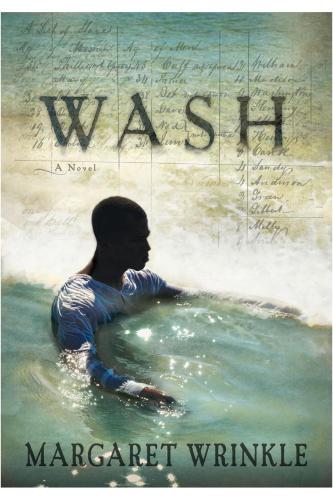
Wash
A Novel
- اطلاعات
- نقد و بررسی
- دیدگاه کاربران
نقد و بررسی

Starred review from November 26, 2012
In this deeply researched, deeply felt debut novel, documentarian Wrinkle (broken/ground) aims a sure pen at a crucial moment following America’s War of Independence when the founding fathers yearned to free the country from the tyranny of slavery. At the center of this story stands Revolutionary War veteran Gen. James Richardson and his slave, Wash. Like Faulkner’s Thomas Sutpen of Mississippi, Richardson had depended on slaves to “carve out of nothing” a plantation on the Tennessee frontier. Though Richardson had wanted to leave slavery behind, he’s driven by greed and still involved with it, he says, “because I can’t stay out of it.” Imagining that the waves of settlers heading further west will need even more slaves, Richardson studs out Wash to neighboring plantations and fills the region with his visage—not the “R” branded to his cheek by his keepers, but Wash’s “dark eyes that let you fall right inside,” his “thick brows... like wings” and what the midwife who becomes Wash’s lover, Pallas, upon later meeting some of Wash’s biological children, calls, “hat dead on, straight ahead way he had.” Worried that another slave, jealous over whom Wash has been forced upon, might come at Pallas for revenge, Wash says he feels “nailed down in a way I want to pull up from. But it’d take too much skin so I don’t.” Undulating between a lyrical third-person narration and the meditative first-person accounts of Wash, Pallas, and a slowly cracking Richardson, the novel well evokes the tragedy not only of the lovers’ untenable positions, but also that of their master and his fragile country. Agent: Marly Rusoff, Marly Rusoff & Associates.

November 15, 2012
Wrinkle bears witness to the inhumanity of slavery in this chronicle of a Southern family in the early 19th century. Richardson, an American soldier captured during the Revolutionary War, comes out of that experience in debt and unwilling to resume his previous life, so after the war, he begins to acquire several slaves. Although he'd just been looking for males, one female, Mena, catches his eye, and he purchases her as well. She bears a son, Wash (or Washington), who grows up under Richardson's watchful eye. It becomes a shocking but natural progression for Richardson to analogize breeding farm animals to breeding slaves, for to Richardson both are simply valuable commodities. Because the worth of a female slave is enhanced when she has children, Wash becomes a "stud" slave. Amid this unimaginable dehumanization, Wash tries to hold on to the West African legacy he's inherited from his mother, and he takes up with Pallas, a healer who's also holding on to her African heritage. Wrinkle moves us effortlessly through narratives recounted by Pallas, Wash and Richardson, so we get three perspectives on the events. She also recounts much of the narrative through a more distancing third-person point of view, a perspective that helps put all three major characters in the same frame. It's a measure of the evil of the system of slavery that Richardson is accounted a "good" owner. As he reflects, "Even a fool knows that whipping is best avoided. Makes them harder to sell. But if it needs to be done, I'll do it myself." His stubbornness is matched by that of Wash himself, who manages to maintain and assert his dignity in an environment that systematically tries to deprive him of it. A moving and heart-rending novel.
COPYRIGHT(2012) Kirkus Reviews, ALL RIGHTS RESERVED.

September 1, 2012
Having explored current race relations in her hometown, Birmingham, AL, in the award-winning documentary broken]ground, Wrinkle investigates slavery in early 1800s Tennessee. A disgruntled Revolutionary War veteran named Richardson makes his money by using his young slave Washington as a stud, forcing the two men into a contentious battle of wills. Undoubtedly striking, uncomfortable reading.
Copyright 2012 Library Journal, LLC Used with permission.

February 1, 2013
Wrinkle's debut novel tells the heartrending tale of life on a slave plantation in early nineteenth-century Tennessee, where the lives of two slaves, Wash and Pallas, intersect with that of Richardson, a land baron and Revolutionary War veteran. Richardson acquires Mena, already pregnant with Wash, at auction in 1796. From his earliest years, Mena tells her son stories of her West African homeland, determined that he grow up knowing who his people are. When debt threatens to overwhelm Richardson, who has been dabbling unsuccessfully in western land development, he decides to hire Wash out as a breeder, much like one of his horses, to neighboring slave owners. This proves to be a lucrative enterprise, but one that gradually breaks Wash's spirit. Until he meets Pallas, a young woman with healing powers who reaches back to his West African roots to help him rise above his harsh surroundings. Wrinkle has written a remarkable first novel, one that will haunt readers with the questions it raises, and the disturbing glimpse it offers into an unfathomable world.(Reprinted with permission of Booklist, copyright 2013, American Library Association.)




دیدگاه کاربران